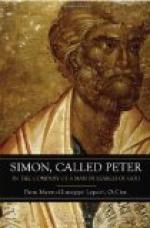It was all so familiar and it was all so different. He stood aloof and looked at himself, and played with the thought. It was incredible that he was the Peter Graham of less than a year before, and that he walked where he had walked a score of times. He went up Whitehall, and across the Square, and hesitated whether or not he should take the Strand. Deciding against it, he made his way to Piccadilly Circus and chose a music-hall that advertised a world-famous comedian. He heard him and came out, still laughing to himself, and then he walked down Piccadilly to Hyde Park Corner, and stood for a minute looking up Park Lane. Hilda ought to come down, he said to himself amusedly. Then, marvelling that he could be amused at all at the thought, he turned off for his hotel.
It is nothing to write down, but to Peter it was very much. Everything was old, but everything was new to him. At his hotel he smoked a cigarette in the lounge just to watch the men and women who came and went, and then he declined the lift and ascended the big staircase to his room. As he went, it struck him why it was that he felt so much wiser than he had been; that he looked on London from the inside, whereas he had used to look from the outside only; that he looked with a charity of which he had never dreamed, and that he was amazingly content. And as he got into bed he thought that when next he slept in town he would not be alone. He would have crossed Tommy’s Rubicon.
Next morning he went down into the country to relations who did not interest him at all; but he walked and rode and enjoyed the English countryside with zest. He went to the little country church on the Sunday twice, to Matins and Evensong, and he came home and read that chapter of Mr. Wells’ book in which Mr. Britling expounds the domestication of God. And he had some fierce moments in which he thought of Louise, and of Lucienne’s sister, and of Mariette, and of Pennell, and, last of all, of Jenks, and asked himself of what use a domesticated God could be to any of them. And then on the Thursday he came up to meet Julie.
It thrilled him that she was in England somewhere and preparing to come to him. His pulses beat so as he thought of it that every other consideration was temporarily driven from his mind; but presently he caught himself thinking what ought to be done, and of what she would be like. He turned it over in his mind. He had known her in France, in uniform, when he was not sure of her; but now, what would she be like? He could not conceive, and he banished the idea. It would be more splendid when it occurred if he had made no imaginary construction of it.
His station was King’s Cross, and he took a taxi to a big central hotel in the neighbourhood of Regent Street. And as he passed its doors they closed irrevocably on his past.
The girl at the bureau looked up and smiled. “Good-morning,” she said. “What can I do for you? We are very full.”




